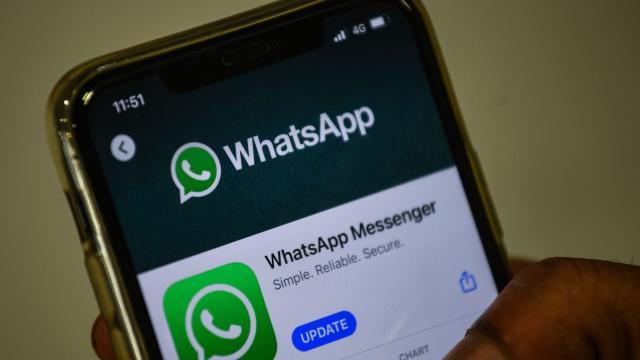After causing a huge virtual meltdown with the announcement of its new privacy policy, and then postponing the implementation of said policy due to online fury, WhatsApp has spent the last few weeks trying not to stir up trouble. However, it has just revealed what will happen to users who do not accept its new privacy policy by the May 15 deadline.
WhatsApp has apparently been emailing some of its merchant partners to inform them that it will “slowly ask” users to accept the new privacy policy “in order to have full functionality” of the app, according to TechCrunch, which saw an email and confirmed its veracity with WhatsApp. The email also pointed to a public WhatsApp FAQ page titled, “What happens on the effective date?”
[referenced id=”1442560″ url=”https://gizmodo.com.au/2020/09/facebook-privacy-is-cool-but-have-you-guys-heard-of-money/” thumb=”https://gizmodo.com.au/wp-content/uploads/2020/09/12/xvqgjhe9rlz9eui40ow9-300×169.jpg” title=”Facebook: Privacy Is Cool, but Have You Guys Heard of Money?” excerpt=”For a platform that likes to keep reminding us over and over and over again that it prizes our individual privacy, Facebook’s done a pretty piss-poor job of actually following through. Over the past few months, we’ve seen the company purposefully prevent any of us from opting out of this…”]
The FAQ page states that WhatsApp will not delete the accounts of users who do not accept the new terms, but that they won’t be able to use it like they normally do.
“If you haven’t accepted by then, WhatsApp will not delete your account. However, you won’t have full functionality of WhatsApp until you accept. For a short time, you’ll be able to receive calls and notifications, but won’t be able to read or send messages from the app,” WhatsApp wrote.
If the “for a short time” part has you scratching your head, WhatsApp did elaborate, sort of. Users who do not accept the new privacy policy by May 15 will be considered inactive users and subject to WhatsApp’s existing policy on that front, as detailed below.
“To maintain security, limit data retention, and protect the privacy of our users, WhatsApp accounts are generally deleted after 120 days of inactivity,” WhatsApp states. “Content stored locally on a user’s device prior to account deletion will remain until WhatsApp is deleted from the device. When a user reregisters for WhatsApp on the same device, their locally stored content will reappear.”
Now, after reading this, it still wasn’t really clear whether WhatsApp would delete accounts of people who haven’t accepted its privacy policy after 120 days. Gizmodo reached out to WhatsApp to ask for clarification. We’ll make sure to update this blog if we hear back.
Besides keeping its head down, WhatsApp has also been trying to reassure users that it doesn’t have any nefarious plans to share their personal data with its parent company, Facebook. (It should be noted that the company has been sharing basic metadata with Facebook, such as phone make anonymous identifiers, since 2016). Just so it’s clear, the app’s new privacy policy does not affect users that just use the app to message with friends and family at the moment. The changes only apply to businesses that use WhatsApp to communicate with their clients.
On Thursday, WhatsApp announced that it would start displaying a banner in the app providing more information about its privacy policy “that people can read at their own pace.”
“Eventually, we’ll start reminding people to review and accept these updates to keep using WhatsApp,” WhatsApp said.
[referenced id=”1669059″ url=”https://gizmodo.com.au/2021/02/what-facebooks-privacy-policies-dont-tell-you/” thumb=”https://gizmodo.com.au/wp-content/uploads/2021/02/03/rgeeseemwm71scvltdzp-300×169.gif” title=”What Facebook’s Privacy Policies Don’t Tell You” excerpt=”Folks, I’m gonna be honest with you. Over my (short) tenure covering digital privacy, I’ve seen my fair share of deeply shitty tech companies pulling deeply shitty stunts in attempts to profit off our personal data. Facebook is one of the names that comes up most frequently here, and that’s…”]
Interestingly, in the announcement, WhatsApp mentioned that it was important that people knew “how we can provide WhatsApp for free.” The company said that it charges businesses to provide “customer service” on the app, and gets Facebook involved so that businesses can manage their inventory across apps.
While some users may be outraged by WhatsApp’s new privacy policy — which, let us remember, does not affect individual users for now — this business update is an important reminder that few things are ever truly free in tech. If a service or app claims it is free, don’t forget you’re probably paying for it with your data.
